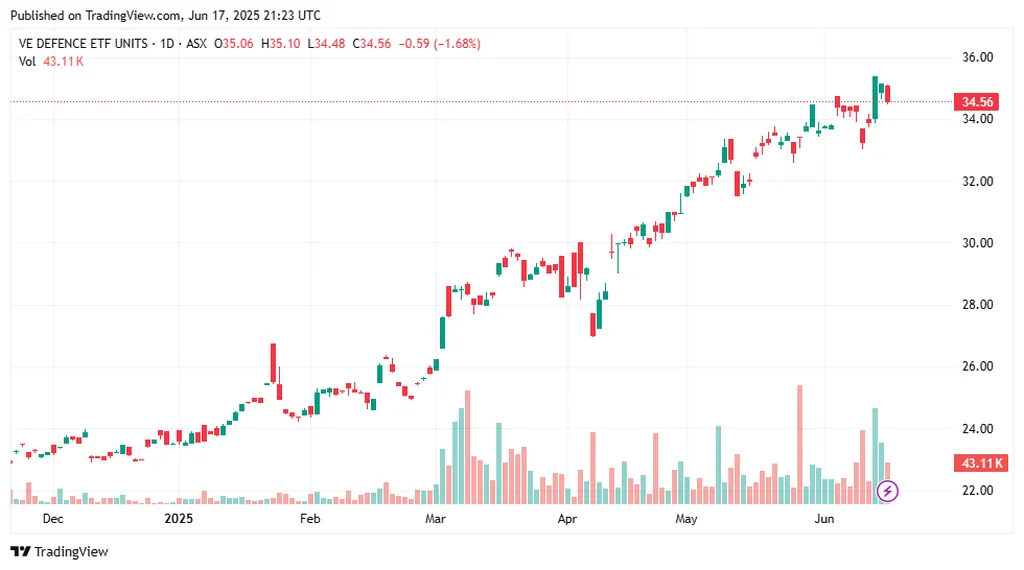Global defence spending is surging, driven by geopolitical tensions, technological advancements, and a growing emphasis on national security. For Australian investors, this trend presents a compelling opportunity to gain exposure to the sector through exchange-traded funds (ETFs) listed on the ASX. Three standout options—Vaneck Global Defence ETF (ASX: DFND), Global X Defence Tech ETF (ASX: DTEC), and Betashares Global Defence ETF (ASX: ARMR)—offer distinct approaches to capitalising on this high-growth industry.
### Vaneck Global Defence ETF (ASX: DFND)
The DFND ETF, launched in September 2023, has delivered an impressive average annual total return of 92% since inception. Priced at $39.18 per unit, it holds 32 shares, tracking the MarketVector Global Defence Industry (AUD) Index. Its top holdings include RTX Corp, Palantir Technologies Inc, Thales SA, Leonardo SpA, and Hanwha Aerospace Co Ltd. These companies represent a diverse range of defence capabilities, from aerospace and missile systems to AI-driven data analytics and advanced electronics.
“This ASX ETF pays dividends once per year,” said the company. “DFND ETF paid its first dividend of 3 cents per unit in July.” The management fee is 0.65% per annum, making it a relatively cost-effective option for investors seeking broad exposure to the global defence sector.
### Global X Defence Tech ETF (ASX: DTEC)
The DTEC ETF, introduced in October 2023, has achieved an average annual total return of 79%. Trading at $18.54 per unit, it invests in 37 shares, tracking the Global X Defense Tech Index. Its top holdings are Palantir, RTX Corp, Rheinmetall AG, Lockheed Martin Corp, and BAE Systems PLC. These companies are at the forefront of defence technology, specialising in AI, aerospace, cybersecurity, and advanced weaponry.
“We believe the global defence industry is entering a super-cycle, shaped by geopolitical urgency and a structural pivot toward technology-first military capabilities,” Global X said. The DTEC ETF did not pay a distribution in its first year of trading, and its annual management fee is 0.5%, making it one of the most affordable options in this space.
### Betashares Global Defence ETF (ASX: ARMR)
The ARMR ETF, launched in October 2023, has delivered an average annual total return of 77%. Priced at $25.90 per unit, it invests in 52 companies headquartered in NATO nations or allied countries, tracking the VettaFi Global Defence Leaders Index. Its top holdings include Palantir, Raytheon Technologies Corp, Safran SA, General Dynamics Corp, and Lockheed Martin Corp. These firms are key players in aerospace, missile systems, cybersecurity, and defence IT services.
“The ARMR ETF pays one dividend per year,” the company said. “ARMR ETF paid its first dividend of 53.546615 cents per unit in July.” The yearly management fee is 0.55%, positioning it as a mid-tier option in terms of cost.
### Strategic Implications for Investors
The rise of defence-focused ETFs underscores the growing importance of the sector in global markets. As geopolitical tensions persist and nations prioritise military modernisation, these ETFs provide a diversified way to invest in companies driving innovation in defence technology. For Australian investors, these ASX-listed funds offer a strategic entry point into a high-growth industry, with the added benefit of exposure to some of the world’s leading defence contractors.
The performance of these ETFs highlights the sector’s potential for strong returns, but investors should carefully consider their risk tolerance and investment goals. With management fees ranging from 0.5% to 0.65%, these funds offer a cost-effective way to tap into the defence sector’s growth, making them a valuable addition to any diversified portfolio.

